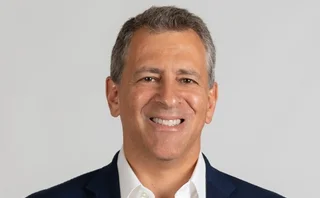
Precious metals house of the year: Citi
Big-ticket gold deal with central bank underscores Citi’s ambitions in bullion

Energy Risk Awards 2016
Compared with some of its rivals in the US and Europe, Citi has not generally been seen as one of the big precious metals houses. But in 2015, it executed what market participants believe to be two of the largest over-the-counter gold trades of the year.
During the first half of 2015, Citi carried out a significant gold transaction with a central bank. While central banks and other sovereigns have traditionally been reluctant to mobilise gold reserves to raise cash, traders say the tough macroeconomic environment has pushed some to consider such a step. In the transaction, Citi used "repo technology" to help its central bank client raise liquidity, says Rick McIntire, London-based head of metals at Citi.
"Our client was looking to augment its dollar liquidity levels and opted to monetise a portion of its gold reserves using a structure designed by Citi that enabled them to transform gold reserves into dollar reserves in both a credit-light and accounting-friendly way," McIntire says.
The structure, which had a multi-year tenor, also included an embedded derivatives hedge to protect against a drop in the price of gold.
Later in the year, Citi facilitated a long-dated gold hedge for a large financial institution in the Europe, Middle East and Africa (Emea) region, the ultimate client for which was a top-10, Emea-based precious metals miner. Through the transaction, the miner was able to protect more than $2 billion worth of its gold production over the next several years. The gold hedge required extensive, first-of-its-kind documentation due to the nature of the products and the hard-to-approve, emerging-markets jurisdiction involved, according to Citi.
As it turned out, the first big trade helped pave the way for the second one. "Citi retained residual risk from the first transaction that enabled us to competitively price and close the second," says Patrick Green, the bank's London-based head of metal options.
Citi's precious metals team consists of 20 front-office professionals, including salespeople, traders and structurers. The bank offers vanilla and structured products on gold, silver, platinum and palladium; exotics offered by Citi on all of the precious metals include combo, compound, extendible, barrier and chooser options, as well as variance swaps.
The bank describes itself as a full-service provider in precious metals, providing everything from day-to-day flow products to major structured transactions. "While a number of the more tried-and-tested bullion houses can do some of the things that Citi can, they can't do all of the things that Citi can do," McIntire says. "It's really our solutions and our ability to handle complex and large risks that differentiates us."
Underscoring Citi's growth ambitions in precious metals, the London Bullion Market Association (LBMA) announced on March 16 that the US bank had became a full market-making member of the group, which serves as a source of liquidity in the intrabank market.
The status means a firm must be willing to offer two-way pricing on gold and silver in three product classes – spot transactions, forwards and options – throughout the London business day. Only four other banks are full LBMA market-makers: Goldman Sachs, HSBC, JP Morgan and UBS. Effectively, Citi took the place of Barclays, which had previously been a member of the elite club but downgraded its membership level after its 2014 decision to scale back its commodities business. Barclays now offers two-way quotes in only one of the LBMA's products classes, spo transactions, according to the LBMA website.
In other moves, Citi has been adding to the menu of precious metals transactions that can be executed on Velocity, its single-dealer platform. Velocity currently offers OTC spot and forwards precious metals trades, and Citi plans to enable e-trading of vanilla options in the coming months. "That's going to tick the box on all three main parts of our flow business, between spot, forwards and options," says Green. "Imminently, all three of those will be covered on our e-platform."
Last but not least, Citi serves the less glamorous side of the precious metals business, by leasing physical inventories to industrial firms that use precious metals for manufacturing and processing purposes. The bank's lease book includes clients around the world, including precious metals refiners, jewellers, banks, petrochemicals companies and glass manufacturers.
"Our leasing business dovetails with our central bank deposit-taking business," explains Green. "One is a borrower, one is a depositor, and having the two allows us to monetise our full bid-ask spread and manage our liquidity."
Only users who have a paid subscription or are part of a corporate subscription are able to print or copy content.
To access these options, along with all other subscription benefits, please contact info@risk.net or view our subscription options here: http://subscriptions.risk.net/subscribe
You are currently unable to print this content. Please contact info@risk.net to find out more.
You are currently unable to copy this content. Please contact info@risk.net to find out more.
Copyright Infopro Digital Limited. All rights reserved.
As outlined in our terms and conditions, https://www.infopro-digital.com/terms-and-conditions/subscriptions/ (point 2.4), printing is limited to a single copy.
If you would like to purchase additional rights please email info@risk.net
Copyright Infopro Digital Limited. All rights reserved.
You may share this content using our article tools. As outlined in our terms and conditions, https://www.infopro-digital.com/terms-and-conditions/subscriptions/ (clause 2.4), an Authorised User may only make one copy of the materials for their own personal use. You must also comply with the restrictions in clause 2.5.
If you would like to purchase additional rights please email info@risk.net
More on Commodities
Energy Risk Asia Awards 2025: The winners
Winning firms showcase the value of prudent risk management amid challenging market conditions
Data and analytics firm of the year: LSEG Data & Analytics
Energy Risk Awards 2025: Firm’s vast datasets and unique analytics deliver actionable insights into energy transition trends
OTC trading platform of the year: AEGIS Markets
Energy Risk Awards 2025: Hedging platform enhances offering to support traders and dealers in unpredictable times
Electricity house of the year: Natixis CIB
Energy Risk Awards 2025: Bank launches raft of innovative deals across entire electricity supply chain
Voluntary carbon markets house of the year: SCB Environmental Markets
Energy Risk Awards 2025: Environmental specialist amplifies its commitment to the VCM
Sustainable fuels house of the year: Anew Climate
Energy Risk awards 2025: Environmental firm guides clients through regulatory flux
Weather house of the year: Parameter Climate
Energy Risk Awards 2025: Advisory firm takes unique approach to scale weather derivatives markets
Hedging advisory firm of the year: AEGIS Hedging
Energy Risk Awards 2025: Advisory firm’s advanced tech offers clients enhanced clarity in volatile times







